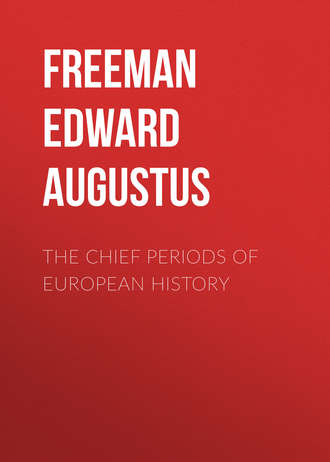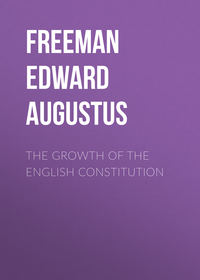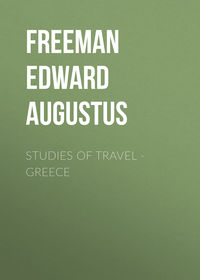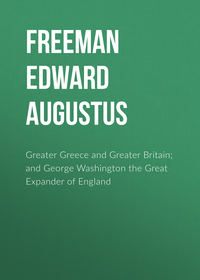 полная версия
полная версияThe Chief Periods of European History
There is only one San Marino within the geographical bounds of Italy, and San Marino is not one of the great cities of Italy. It is therefore a harmless political curiosity, with whose rights the Italian kingdom has no temptation to meddle. It might be otherwise if the kingdom had many such independent towns and districts within its borders, and if any of the great cities of Italy were reckoned among them. Now one of the ugliest features of Roman history, one which comes out in every page of the history of the second century B.C., is the ungenerous way in which Rome treated her independent allies the moment they ceased to be useful to her. As long as they served as checks on some other power, so long they were made not a little of; as soon as the dangerous power was overthrown or humbled, the ally which had helped to overthrow it became an object of Roman jealousy. The friendly power whose day of usefulness was over was exposed to endless attempts on the part of Rome to weaken and break it in pieces. Such is the tale of the kingdom of Pergamon, of the city-commonwealth of Rhodes, of the confederation of Achaia. No part of Roman history is more disgraceful than the dealings of Rome with those three states, the model governments of their several classes. No learning, no eloquence, can avail to whitewash the faithless and brutal dealings of the Roman Senate towards powers whose only fault was to be weaker than Rome and to have done good service to Rome. This feeling of jealousy towards the allies lingered on long after all ground for jealousy had passed away, when the free city was free only within its own walls, and could not lift hand or foot against the mighty ally by whose dominion it was hemmed in. But the wrongs of these cities under Roman rule were far more largely due to more immediate causes, to the overbearing love of power, to the baser love of gain, which formed the dark side of the Roman character. The liberties of these weak states were often encroached on, not only by the Roman state itself, but by particular Roman magistrates, and even by powerful men who were not at the moment magistrates. The establishment of the Empire undoubtedly did something to check the oppressions of the Roman governors, on whom there was very little check under the commonwealth. But if the Empire led to less oppression on the part of the representatives of the central power, it led to more meddling on the part of the central power itself. A man placed at the head of the world stands in a different position from a city placed at the head of the world. To the ruling city the dependent states are simply dependent states; it gets what it can out of them, but it has no temptation to meddle for the sake of meddling. The ruling man has temptations to meddle, and it may even be that, the better disposed he is, his temptations to meddle become greater. The natural tendency of the Empire was to unity and centralization everywhere and in every way. Under imperial rule, the endless variety of relations among the allies, dependents, and subjects of Rome gradually changed into the one character of direct members of the Roman Empire. But the change was slow. Sovereign commonwealths sank into municipalities, and municipalities sank into something less than municipalities, by mere force of circumstances, without any formal act. It is often very hard to say when this or that free city finally lost its distinct being through absolute incorporation in the Roman Empire. It is certain that the memory of past freedom, as something that still was not wholly past, lived on for ages. Under the early Empire the commonwealths of Greece and Asia, whatever was their formal relation, were in practice, not only subject to the Roman Empire, but very much at the mercy of the governors of the provinces within which they geographically lay. But they still were commonwealths, though dependent or even subject commonwealths. Their senates, assemblies, or other ruling bodies, had practically sunk to the functions of town-councils, and they were open, in a way in which an English town-council is not, to the caprice of an external power. But they were town-councils which had been sovereign parliaments. Some of them were in theory sovereign parliaments still. And even those which were furthest from that character, the councils of those towns which were neither free and allied states, nor Roman colonies, nor in any way privileged above the general provincial relation, had not wholly lost their original character. Deep into the time of the Empire, the old character of the Roman dominion, that of a city ruling over other cities, still left its traces. In such a state of things the authority of the councils or assemblies of the subject states might practically be smaller than that of the town-council of an English borough. That is, the assembly might be afraid of acting in any matter of importance without the leave of the central power or its representative. It might practically confine its action to matters of routine and ceremony, at most to votes of honours and setting up of statues, because any bolder action would awaken Roman jealousy. That is to say, the free and allied state could in theory do everything, even the provincial town could in theory do many things, according to its own free will. But generations of submission to an irresistible neighbour had taught it not to exercise that free will except according to the higher will of the power which was supreme over all. If the rights of the subordinate state became formal or even null, it was because they were wide and indefinite; they were the powers of a community which still kept a distinct being, but which was placed under the irresistible influence, sometimes under the direct dominion, of a stronger community. This is a position altogether different from that of a town or district in a modern kingdom or commonwealth where every part of the land has equal rights. In such a kingdom or commonwealth, whatever powers, great or small, this or that board or council has, are held according to the law of the land. As long as those powers are exercised according to the law of the land, no administrative interference is to be feared; if the law is broken, if the local authority steps beyond its legal powers, the wrong will be made good, not by an arbitrary will, but by a legal process. It was wholly different with the cities of which we speak, whether free, dependent, or subject; they were still separate commonwealths with inherent rights, even if those rights could no longer be exercised; their assemblies had once been parliaments, and to both the forms and the feelings of parliaments they still clave. And one city at least among the allies of Rome kept its substantial freedom down to an age when many fancy that the Roman power itself had altogether vanished from the earth. The freedom of Cherson was overthrown, not by Mummius in the second century on one side, not by Vespasian in the first century on the other, but by the Amorian Theophilos in the ninth. Till that day the last of the Greek commonwealths lived on its ancient life, and for the simplest of reasons. Not only the Emperor himself, but the proconsul of Achaia, of Macedonia, or of Asia, could at any moment encroach on, the Emperor could at any moment destroy, the freedom of any Greek city that lay geographically within those provinces. He had always the physical power to encroach or to destroy; not uncommonly he had the will. But the commonwealth which lay far away in the Tauric Chersonêsos stood in another case. The faithful ally could not be changed into the helpless subject, except by the same kind of effort which was needed for a Gothic or a Persian war.
The long abiding independence of Cherson is a fact to which I have often had occasion to call attention from other points of view. So is the independence of the Lykian League, though the less favourable geographical position of that power allowed its freedom to come to an end eight hundred years sooner than the freedom of Cherson. I have elsewhere spoken of that League as perhaps the most skilfully planned example of a federal constitution that the elder day could show;[2] it concerns me now as an example of the degree of independence which a considerable territory could keep under the general supremacy of Rome, from the fall of Perseus to the reign of Claudius. For the story of its origin we have to go to the narrative, unhappily fragmentary, which Polybios gives of the events which led to the deliverance of Lykia from Rhodian rule;[3] for a full account of its constitution we have only to turn to the description of Strabo.[4] It is specially instructive when the geographer tells us that the League still kept the right of war and peace, though, he adds, in his day that right could not be exercised at all, or could be exercised only as Rome thought fit.[5] After reading this, it is certainly curious to read the comment of a recent scholar who thinks that the powers of the League and the measure of its independence were something like those of the city of London.[6] A nearer analogy might surely be found in the relations in which many of the smaller powers of Europe stood not very long back; it is not very unlike that in which some of them stand at this moment. The position of Lykia towards Rome is very like that in which various Italian and German states stood towards Austria forty years back. It is very like that in which Servia at this moment stands to Austria and Montenegro to Russia. It is in short the position of a “protected” state, whether the protection be avowed or only practical. But there is this important difference. A protected state now has at least some voice in choosing its protector; it can exercise the old Teutonic right of seeking a lord. And a small state may even keep perfect independence without any protector at all, simply through the jealousies of the greater powers. A small state may sometimes live on in perfect freedom surrounded by powers stronger than itself. Any one of them could at any moment put an end to its freedom; but none of them is likely to make the attempt, because the others, for their own ends, will not allow it. But Rome stood alone in the world; there was no choice of protectors; whatever independence was left was held only by Roman sufferance. Whenever it suited Roman policy or caprice to extinguish the independence of any state, the thing was done.
The Lykian League, as embracing a considerable territory, has, from its geographical side, more in common with the kingdoms and principalities which lived on under Roman vassalage, than with the single city-commonwealths which supply the examples which most naturally occur to us. It must have been beyond the power of any single proconsul in a peaceful time seriously to interfere with the liberties of Lykia. It is true that the federal states of Greece still lived on for Pausanias to see them at work; and two generations earlier the sacred convocation of the Amphiktyons had drawn a new life from the measure of redistribution ordained by the Emperor Augustus.[7] But we may be sure that no confederation of old Greece kept anything like such a measure of political life as that which Strabo saw at work in Lykia. What little life there still was in the Greek world abode in the single cities, and there was doubtless more life among the Greek cities of Asia than in those of old Greece. Of Lykia in Strabo’s day we have only Strabo’s general description; we have no detailed illustrations of the working of the political system; least of all have we any speeches, any letters, any political treatises, either from Lykian orators or philosophers or from Roman magistrates who had dealings with the Lykian League or its cities. Let us leap on to the age of Trajan, and we shall find that that age is rich in materials for the political life of the Achaian and Bithynian provinces and of the free cities which lay within their geographical boundaries. We have four highly instructive contemporary writers, two Greek and two Latin, one of the latter being the renowned Emperor himself. We have from Plutarch a treatise on the duties of a Greek statesman of his day. We have from Diôn Chrysostom several speeches actually delivered in the assemblies of Greek cities in the reign of Trajan. We have the correspondence of Trajan himself with the younger Pliny when Pliny was proconsul of Bithynia. We thus get two sides of the picture. We see how things looked in the eyes of two literary Greeks, one of whom to be sure was bound to make the best of things and to make his rhetoric as acceptable as he could to his Greek hearers. We see also how things looked in the eyes of two official Romans, an Emperor and a proconsul who were among the best of their several classes, but whose very virtues laid them open to one special temptation. Both Trajan and Pliny loathed oppression and wrong of every kind, and they sincerely sought the welfare of all for whose welfare they were responsible. But for that very reason they were more likely to be led to constant meddling with the affairs of their subjects than rulers who might now and then be guilty of some gross piece of tyranny, but who for the most part left people alone in the time between one act of oppression and another. The colouring on the Greek and on the Roman side is very different; but the main outlines are the same in both pictures. In both cases we see cities which keep much – which in some cases keep everything – of the outward show of free commonwealths, but which do not dare to exercise their powers, even in very small matters, without the knowledge and good will of the Roman prince or his local representative.
The political treatise of the wise and kindly Plutarch[8] is one which cannot be read without sadness. To a Greek, a Bœotian, living in a land which had once been so great and which was so utterly fallen, the contrast between what had been and what was came more keenly home than it could come to his Asiatic contemporary. The cities of Diôn’s native Bithynia had never been so great in the past, and they were far more prosperous in the present, than the cities for whose would-be statesmen and orators the sage of Chairôneia had to give rules. But in both writers we find things looked at from the same general point of view. Local independence is assumed as the state of things which exists at least in theory. We read page after page of both Plutarch and Diôn without any hint that the commonwealths of which they were speaking had any superior beyond their own walls. Both write in a way in which no one would write for the instruction of a newly-chosen town-councillor in a modern state. It is for parliaments, not for town-councils, that the whole language is fitted. But ever and anon we come to some passage which shows us that the parliaments with which we are dealing are parliaments working in fetters, parliaments which can practically do nothing without the approval of a foreign superior. In our own land we find the nearest parallel in ecclesiastical bodies, and the likeness is increased by the fact that the range within which the Greek assemblies of that day were most active was that which concerned religious worship and that large class of subjects which in Greek ideas were connected with religious worship. A Convocation organized like a Parliament, carrying on its debates as freely as a Parliament, but whose acts go for nothing unless they have the licence of the Crown beforehand and the consent of the Crown afterwards, a Convocation which, without ever being suppressed, without ever having its formal meetings interrupted, could be practically suspended for a hundred and fifty years, has far more likeness to one of these Greek assemblies than can be found in a local body whose powers are narrowly defined, but which can freely exercise such powers as it has. We have another parallel in the Chapter electing its Bishop, electing him freely according to all outward look, but whose choice not only needs the approval of the Crown, but is actually dictated beforehand by the Crown, under heavy penalties if that dictation is not obeyed.[9] We read several chapters of Plutarch which might have been written for any Greek commonwealth in days before either the later or the former Philip. Presently the mention of certain demagogues who corrupted the people by shows of gladiators is a sign that the Roman has entered into the Greek world.[10] But, for anything in that or in several following chapters, the commonwealths so corrupted might have been as independent as when earlier demagogues were said to have corrupted their countrymen by allurements of other kinds. We go on further, and the full truth comes out. The Greek commonwealths of Plutarch’s day had no longer anything to do with wars, with alliances, with putting down of tyrants, and some might think that in such a state of things there was no room for statesmanship left. Plutarch thought otherwise; there were still public trials at home; there were embassies to be sent to the Emperor; there were dealings with Roman governors, possibly with bad governors. These things needed some qualifications; energy, daring, discretion, were all needed by those who had to plead for the weak before the powerful.[11] The chosen magistrate was not to despise his office because he had not so free a field as the magistrates of old times; but he was never to forget the difference between him and them. Periklês might say that he was called to rule among freemen, among Greeks, among Athenians. The magistrate of Plutarch’s day was to remember that he ruled with a ruler over him; that his city was in subjection to the proconsuls of Rome, to the procurators of Cæsar.[12] War was impossible; of freedom they had as much as their masters left to them, as much perhaps as was good for them[13] when Greece was so weak, when there was no power left in her which the slightest bidding of a proconsul could not upset.[14] In such times public men must be careful to give no offence, no occasion, to dangerous neighbours; they must above all avoid such occasion as was given by disputes at home or with other cities. At the same time, while fully understanding their dependent position, they must avoid base cringing and flattery; they must not make the governor yet more of a master than he is disposed to be by calling him in on all occasions;[15] and it will be wise to make some powerful Roman their friend.[16] They will do well to study the records of old Greece, but only for examples suited to the actual state of things; tall talk about Marathôn and Plataia and Eurymedôn should be left to the rhetoric of the schools; but peaceful examples from earlier times, examples of courtesy, humanity, and good faith, were as instructive then as they ever had been.[17]
The precepts of Plutarch are perfectly general. He draws no distinction between the different classes of cities, according to the greater or less degree of independence which they still formally kept. For in truth they were all practically in the same case; all had, in his own phrase, the shoe of the Roman over their heads.[18] The provincial town could act freely in many things, if the governor did not choose to meddle; the independent ally could not act freely in any thing, if the governor did choose to meddle. We find things on the whole the same when we turn from the philosopher giving wise precepts in his study to the orator actually haranguing the assemblies whose duties Plutarch so carefully lays down. Diôn Chrysostom is a rhetorician by profession, and he has the faults of his profession; but there is much that is attractive about the man and his writings, and he gives us several instructive pictures of Greek life in his own day. His orations on subjects of theoretical politics, on kingship, aristocracy, democracy, and the like, sound a little unpractical under the universal rule of Rome; but we must remember that it mattered a good deal whether the reigning prince was Domitian or Trajan. We gain real additions to our knowledge from the picture of the Euboian hunter, possessed of the civic franchise but who had never been in the city, and we learn better what an Euboian city was like in Diôn’s day.[19] More interesting still is his picture of the Greek city of Olbia or Borysthenês, still clinging to its Greek speech and manners amid the constant attacks of dangerous barbarian neighbours.[20] Of more importance for our purpose is his oration to the Rhodians, an oration of good advice, but of course largely mingled with panegyric on his hearers and their city. This is a document of deep interest, if read by the light of the history of that illustrious island in the second century before Christ. Rhodes is throughout addressed as a free commonwealth, as a democracy;[21] it is the one Greek state besides Athens which keeps its freedom;[22] it is the only one which still cherishes the glory of the Hellenic name.[23] The relations of the state to Rome are nowhere dwelled upon after the manner of Plutarch; Emperors are several times casually mentioned, but not as masters;[24] the point of connexion between Rhodes and Rome of which the orator is most inclined to speak is the part played by the Rhodians in the Roman civil war.[25] He knows of no break between the mighty Rhodes of an earlier day and the still flourishing democracy which he harangues. Some of his sayings could hardly have been approved by Plutarch; they are too much in the Marathôn and Eurymedôn style; but they could not, even as flourishes, have been addressed to a people who were not free, at least in theory, however precarious might be the tenure by which their freedom was held.
Less interesting in themselves than any of these, but perhaps in a certain way more instructive, are the speeches which Diôn makes in his own city of Prusa and in other towns of his native province. He had to preach peace and concord both to rival cities and to rival parties in the same city, and also to plead his own cause against his own enemies.[26] The assemblies which he addresses are always assumed to be self-acting bodies; references to the existence of Rome come in only casually, and Diôn does not often copy the plain-speaking of Plutarch.[27] But the speeches of the Greek orator put on a tenfold interest when we come to compare them with the memorable correspondence which is luckily preserved to us between a Roman Emperor and a proconsul of Bithynia in Diôn’s own day. The letters which passed between Trajan and Pliny seem at first sight to describe a wholly different state of things from that which appears in the speeches of Diôn. If we compare the two, we shall see that they set before us two opposite sides of the same state of things. From the two together we shall get a clear notion of the state of the various cities of Bithynia, and of the different relations in which, like those of any other province, they stood to the ruling power. Speeches and letters together illustrate the show of freedom which existed in perhaps every case, the reality of freedom which existed in some cases, and at the same time the precarious tenure by which both the shadow and the reality were held. We see the ordinary provincial town, still keeping the style of “res publica,” passing “psephismata,” sending “legati” to the Emperor and the neighbouring governors, playing in short at being a commonwealth, but not venturing to do any local act of the least importance without consulting the Emperor’s representative. Diôn brings out one side, Trajan and Pliny bring out the other side; that is all. Diôn makes a speech to the people of Nikomêdeia, exhorting them to peace and harmony with the people of Nikaia. Many passages would have been in place in the mouth of a mediator between Athens and Sparta five hundred years earlier. There is no direct mention of any superior authority as bearing rule over both; the orator indeed tells his hearers that after all they cannot make war on their enemies,[28] and warns them lest by their dissensions they make the Greek name ridiculous among the Romans.[29] We are for the moment amazed when we turn from this picture of two seemingly independent commonwealths to the letters which show how the Emperor and his representative had to be consulted by Nikomêdeia, Nikaia, and every other city, about the smallest municipal regulations, about every kind of local improvement.[30] It is an odd comment on the dissensions between city and city of which Diôn speaks, when Trajan, remembering how Nikomêdeia and other cities had been torn by seditions, will not allow the creation of a company of firemen, lest it be turned to some dangerous political purpose.[31] We again feel sure that Pliny, in his zeal, meddled in many matters which a worse proconsul would have left alone, and that, in his desire to do right, he referred many things to the Emperor which such a proconsul would have settled for himself in a high-handed way. Reading speeches and letters together, we better understand both. We are dealing with commonwealths, but with commonwealths acting in fetters. They do everything for themselves by votes of their own assemblies. But those votes need a licence beforehand, a confirmation afterwards, or both the one and the other, from the overruling power that stands without.[32]







